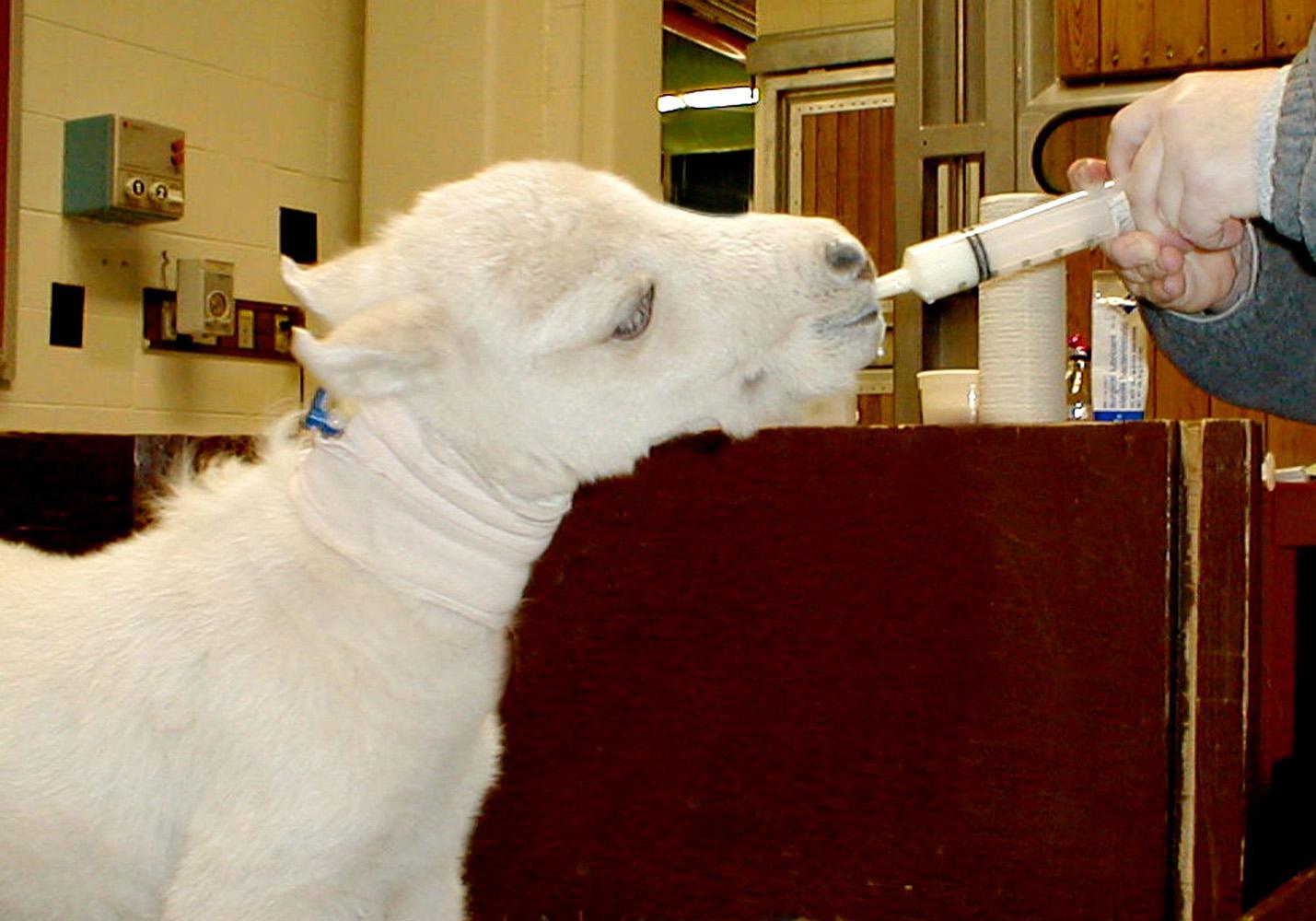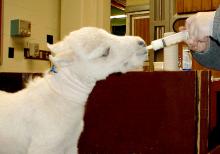Information Possibly Outdated
The information presented on this page was originally released on April 7, 2003. It may not be outdated, but please search our site for more current information. If you plan to quote or reference this information in a publication, please check with the Extension specialist or author before proceeding.
Miniature horse is a major "Miracle"
By Laura Whelan
MISSISSIPPI STATE -- When a pregnant, ailing miniature mare came to Mississippi State University's College of Veterinary Medicine for treatment, veterinary staff feared they would lose both mother and baby.
"The mare had suffered severe colic for two days," said Dr. Katie McGahee, the CVM equine resident on the case. "After surgically opening her abdomen, it was evident that her intestines were damaged beyond surgical repair and she would have to be humanely put down."
Because the exact breeding date of the mare was unknown, veterinarians at MSU's Animal Health Center could not determine the age of the foal or its chances of survival if delivered.
Owners Larry and Liz Jenkins of Stringer wanted to save the foal if possible, so after consulting with reproduction specialist Dr. David Christiansen, McGahee delivered the foal on Feb. 17. Initial resuscitation was administered in the operating room by anesthesiologist Dr. Paula "P.K." Hendrix.
After a thorough examination, doctors estimated the foal was about four weeks premature. Foals develop most in the last two weeks of the gestation period, so this was a very high-risk baby. His amazing survival earned him the name "Miracle."
The premature foal had many immature body systems. Among his immaturities, Miracle's eyes were not open, he could not regulate his own body temperature, his suckle reflex was weak, and he was unresponsive to stimuli as if he were still in the uterus. His flexor tendons were lax, so he could not stand and could barely move.
Students in the equine rotation attended Miracle around the clock, regulating his intravenous feedings and fluids, doing physical therapy and administering medication.
"Because his condition was so critical, it was important that someone be by his side at all times," McGahee said.
Slowly but surely, Miracle began showing signs of improvement. After three days, Miracle opened his eyes and took his first glimpse of the world. At 10 days, Miracle was holding up his head and was responsive. He was placed in a sling three or four times per day to orient him properly and allow him to feel pressure on his hooves so he would learn how to stand. Eventually Miracle gained strength and was allowed outside.
"Going outside really stimulated his interest, and he worked hard at learning to walk, then trot, canter, buck and kick up his heels. It took a while to get to that point, but Miracle is a determined little guy," McGahee said.
After 14 days, Miracle's weight had increased from a low of 26 pounds up to 28 pounds. He had learned to drink from a bottle and was taken off his IV as well as all other medications. Miracle was ready to go home.
"There was no expectation that he would survive when he was delivered," McGahee said. "But he beat the odds. This foal is a rare success for one delivered so prematurely.
"This was a huge team effort, 24 hours a day for two weeks. Many of the students, staff and faculty played a role in helping Miracle survive. As a result, Miracle now has quite a following here at the vet school."
The Jenkins report that Miracle is doing well at home, but his impact on MSU-CVM will not fade quickly. "Miracle is a very special horse who taught us all a little something about life and success," McGahee said.
Miracle served as an inspiration for a new research project at MSU-CVM. McGahee and senior veterinary student Dawn Tucker received funding from the American Miniature Horse Association to develop an assessment system for veterinarians to use in estimating survivability in premature miniature horse foals.
"Our hope is that when a veterinarian must advise an owner about survival odds, we can provide some concrete data for decision-making, and they can feel confident they are giving their patients the best possible care," Tucker said.
Contact: Dr. Katie McGahee, (662) 325-1400





